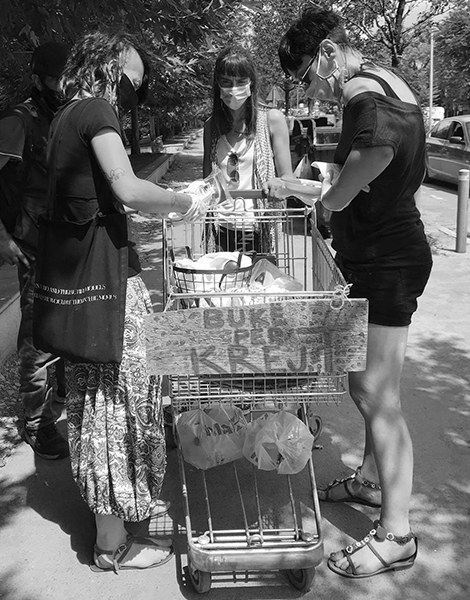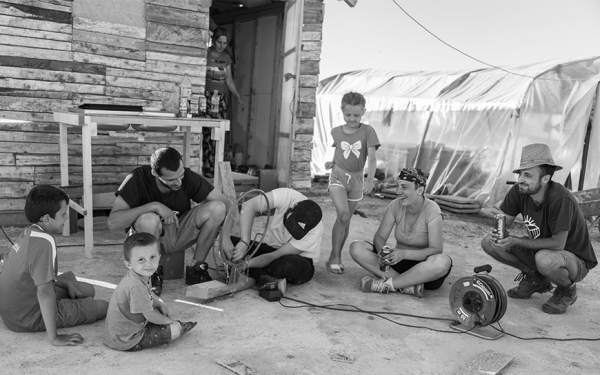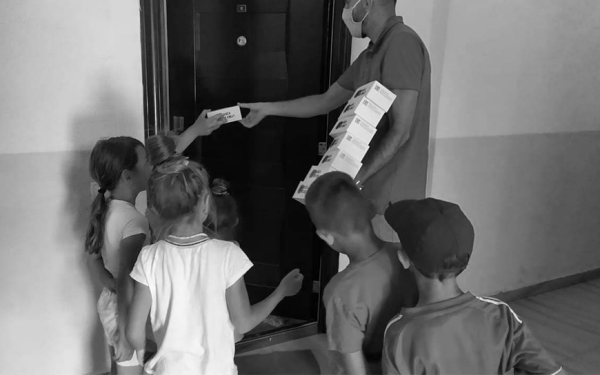
Just four years ago, Termokiss was an abandoned industrial building, one of many such eyesores on Pristina’s cityscape. The building was initially constructed in the 1980s as part of the central heating exchange structure, but it was never completed and it was later abandoned. The transformation of Termokiss into the cultural centre that it is today came about due to a number of fortuitous events.
In 2016, an international team led by the Belgian organisation Toestand, an organisation committed to the temporary transformation of vacant urban spaces to develop socio-cultural projects, visited Pristina with an idea of carrying out an urban-transformation project with local activists. They met up with a young woman writing a Masters’ thesis on abandoned buildings in the city, who identified the Termokiss building as an appropriate site for the project.
As Erleta Morina, a community organiser at Termokiss relates, a group of local volunteers rapidly came together to work on the project. "Young people were desperate to have a place to meet and to get involved in social and cultural activities. There was almost nowhere for us to go, except cafés, and we were fed up just meeting for coffee and talking about what we wanted to do. There comes a point where you really want to do something. Termokiss was a reaction to this need,” she explains.
While under Kosovan law as a municipal space the building was also de facto a public space, the municipality did not know how to proceed with the authorisation for the project. For a while it looked as if the new cultural centre risked failure before it had even opened. It was thanks to pressure from the local diplomatic community that the authorities eventually relented, agreeing that the building could be accessed by the volunteers, but only for the duration of the initial project.
That July, a team of international and local volunteers worked for 10 furious days to convert the concrete structure into a temporarily viable space by using recycled materials, erecting a chipboard roof and putting plastic and glass bottles in the window spaces.
Following this first flurry of activity, volunteers continued to meet in Termokiss on the basis of an email from the municipality stating that they were ‘working on’ their dossier.
“We squatted for 10 months till we agreed on the terms of the contract. During these 10 months we had that email, so when the Municipality’s inspection came to check up on us, we showed it to them to reach a level of understanding. It gave us the time to work out how we wanted to proceed,” relates Morina.
The Termokiss volunteers agreed that they wanted the new centre to be community-run, where there is shared responsibility and where everyone’s word counts. That first October, they held a marathon star-studded six-hour-long concert, their only paid event to date with revellers giving what they could afford to crowdfund. More than 800 people attended and they raised enough money to fix the building’s roof. They also launched an online crowd-funding campaign to repair other parts of the building targeted at the Kosovar diaspora.
Termokiss quickly became a busy hub of activity, hosting everything from cooking lessons, ping pong sessions, children’s art and drama classes, community gardening, yoga, woodwork, slam poetry sessions, jam sessions with guitarists to sewing groups.

Around 40 people, most of them volunteers, are now involved in the day-to-day running of the centre, including a few community-organiser and administrative staff. But as Morina insists, this is a democratic operation.
“A lot of people are often confused when they first come to Termokiss. They want to know who is the boss? Who runs this place? Sometimes it can take a while to understand the community-spirit behind this project. We run open elections. If a particular role becomes vacant, community members would apply for those positions and the election would be held during our weekly meetings and then everyone votes,” she says.
Central to the idea of Termokiss is the concept of generational change – the first volunteers who instigated the opening of the centre have now moved on to other projects and they have left space for a new generation of volunteers, who bring their ideas to the centre and are responsible for its future development.
With EED funding, Termokiss recently installed a new co-working space separate from the main area of the building. They have also installed new acoustics and ventilation systems, as well as a kitchen. Unfortunately, the recent lockdown enforced in Kosovo during the coronavirus outbreak has meant that the team was not able to use these facilities in recent months.
Speaking to EED during the lockdown period, Fjolla Brisku, who works on communications and PR, explained that the Termokiss community were quick to react to the challenges posed by the Covid-19 epidemic. The team initially focused on providing advice via their social media channels on the best ways to protect themselves and the community from Covid-19.
“A team of volunteers made fabric facemasks, and we distributed hundreds of these to vulnerable families in Pristina. We then launched a ‘Masks for All’ campaign to raise awareness of the public-health advantages of mask-wearing during the pandemic,” she relates. She goes on to explain that in Kosovo, an avalanche of disinformation about the virus means that many people are ill-informed about how to best protect themselves and others from infection; indeed, many older people deny the virus’ existence.

Towards the end of March, Termokiss also began to shift their cultural programme online. They live-streamed film screenings on Facebook that were followed by animated discussions with the film directors. They held online meditation sessions, Spanish club nights, poetry clubs and even virtual exhibitions, with artists exhibiting their work online. They also launched a ‘Food for all’ initiative, where they collected donated food ingredients and cooked hot meals that they then distributed to the homeless community in Pristina.
Even though the community was able to adapt its program and activities online as well as to the specific circumstances, Covid-19 still had an enormous negative impact on cultural organization structures which took years to be shaped, with Termokiss being no exception. Specifically, the struggle now lies in finding further funding opportunities and support during these times, EED being one of the main ongoing funds supporting the community.
In recent weeks, Termokiss have once again moved more of their activities back to their building, as lockdown measures have eased.
As Termokiss celebrates its fourth year of existence, it is now collaborating with other local communities in the Western Balkans to help them develop similar centres in their countries. In the past couple of years, the team were involved in projects in Tetova, in North Macedonia and Tirana, in Albania, where together with the local community, revitalized abandoned buildings to be used for social and cultural activities based on community needs.
According to Morina, such projects give meaning to young people’s lives as well as helping them to gain new skills and experience. In a country like Kosovo, a project such as Termokiss offers young people hope and the possibility of a productive future at home.
As the Termokiss team see it, such civil activism projects are vital for their country’s future. “In the past, we were always told what to do and we felt powerless. Thanks to Termokiss, young people feel we can play a really valuable role in our societies. The time has come when young people want to take the initiative and start solving their own problems. We have become tired of waiting for other people to do it for us,” concludes Morina.
This article reflects the views of the grantees featured and does not necessarily represent the official opinion of the EED.
*All references to Kosovo should be understood without prejudice to positions on status, and in line with United Nations Security Council resolution 1244/1999 and the ICJ Opinion on the Kosovo declaration of independence.